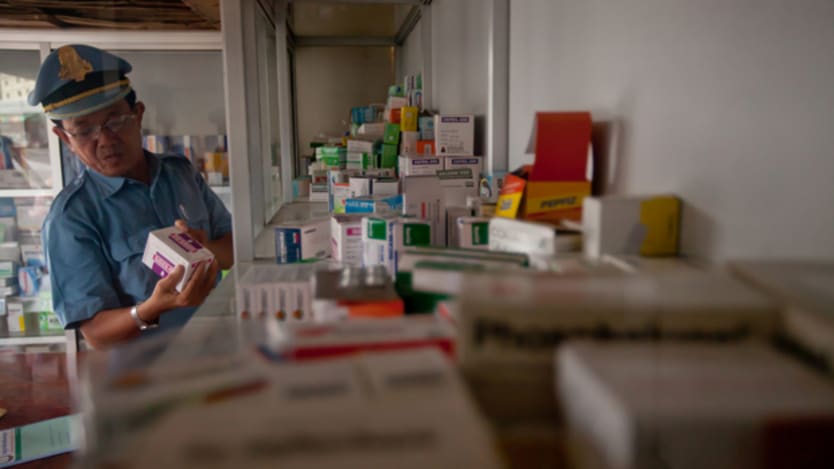
As nurses, we deliver up to 80 percent of all health care services worldwide so it is crucial we are aware of the potential risks to patient safety, particularly those difficult to detect.
Fake medicines are thus a real concern for us because of their ability to compromise the efforts we put into delivering the best possible care to our patients and the populations we protect from diseases like malaria.
A real life example of how fake medicines can compromise safety is the story of Victoria Amponsah. She was diagnosed with malaria when she was two months pregnant. As any patient would, she used a prescription to purchase medicine from her local pharmacy in Accra, Ghana, believing it to be safe and effective. Instead, her condition quickly deteriorated and she was admitted to a hospital, soon learning that she had been sold a counterfeit drug. Today, Victoria and her son are lucky to be alive and healthy. Her ordeal is just one among thousands of similar stories we see in our daily work.
So as health care professionals striving to ensure the welfare of our patients and facing the challenge of fake medicines, we constantly wonder what else can be done to ensure our patients are not put at risk.
Widespread danger
It's difficult to calculate the amount of fake medicines in circulation around the world.
The World Health Organization estimates that in some countries, less than 1 percent of medicines are fake, whereas in parts of Asia, Africa and Latin America, they may account for 30 percent of drugs in circulation, as counterfeit medicines are increasingly finding their way into legitimate drug supply chains. They no longer only pose a risk to those who buy their pills off the street or over the Internet.
The problem is aggravated by a persisting myth that counterfeit medicines concern mainly “lifestyle drugs,” whereas in reality 700,000 people die each year as a direct consequence of fake malaria and tuberculosis drugs.
In fact, in middle- and low-income countries, the most counterfeited medicines are those used to treat malaria, tuberculosis, and HIV and AIDS, particularly in the case of the 30 percent of countries with little or no regulatory authority dedicated to combat this problem.
A growing threat
The past decade has seen an impressive mobilization of resources and political will to reduce worldwide suffering from malaria: 50 countries are on track to reduce the cases of this preventable and treatable disease by 75 percent by 2015.
However, the rise of fake drugs presents a growing threat to the safety of malaria patients, and even has the potential to undermine the progress made in containing the disease.
Counterfeit medicines often lack the correct active ingredient or contain the wrong dose, or they may even contain toxic substances, making them not only ineffective but potentially very dangerous. This has devastating results for the treatment and well-being of people who have malaria, as well as on entire communities because fake medicines increase drug resistance in malaria parasites, prolong infections and undermine public confidence in health care systems.
This is why, when on World Malaria Day we celebrate the progress made, we must also not forget that one in three malaria drugs in Southeast Asia and sub-Saharan Africa are fake and that every 5 minutes, a child dies of malaria because of taking fake medicines. This is why the International Council of Nurses, along with our Fight the Fakes partners and many other actors across the global health community, are determined to do even more to counteract this growing problem.
Global concerted action needed
These efforts cannot exist in a vacuum. All stakeholders involved at all levels of the supply chain must work as allies, exchanging knowledge, experience and tools to best protect ourselves from the dangers of fake medicines.
So what can we do?
Nurses, as well as other health care professionals, must be vigilant in screening for counterfeit medicines and monitoring unusual side effects. The regulatory authorities must be proactive and uncompromising in cracking down on those who place counterfeit medicines on the market. The pharmaceutical industry, for its part, needs to invest in anti-counterfeiting technologies, along with research institutions. These activities should also be supported by wholesalers that can ensure medicines are sourced from legitimate providers. NGOs and foundations can also help by guaranteeing funding and medicine procurement for safe and effective treatments.
Last but not least, empowering patients is also a critical component in addressing counterfeit medicines — we should help the general public learn more about the issue to better protect themselves.
Great changes already being made
As Fight the Fake partners, we want to ensure that Victoria’s story does not go unheard and that history does not repeat itself.
Under our umbrella campaign, our partners across all fields of global health are working to make people safe, informed and engaged. Organizations involved in the Fight the Fakes campaign have been working toward innovative and in-country solutions to fake medicine problems.
Each partner contributes its specific expertise to ensure our efforts complement each other using distinct strengths we have in different areas. For example, some are working on the ground to keep fake medicines out of legitimate supply chains by setting up training centers for health care professionals. They are also providing mHealth solutions to empower patients so that they can be reassured of the quality of their medicines, and creating petitions to demand greater commitment to fighting fake medicines from national governments.
I think you will agree with me that we all have a role to play. So — have you asked yourself what you can do?
Read more:
A new public-private strategy to combat malaria and tuberculosis
Drug-resistant parasites threaten global anti-malaria crusade — WHO
Join the Devex community and access more in-depth analysis, breaking news and business advice — and a host of other services — on international development, humanitarian aid and global health.








